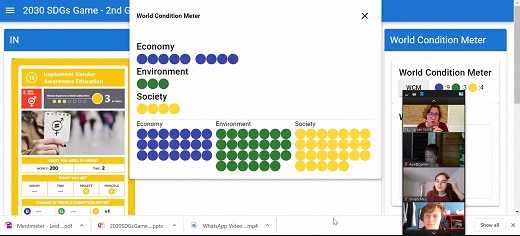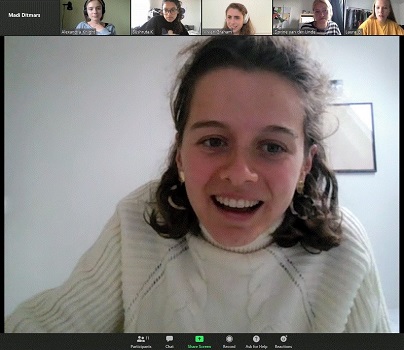The 2030 SDGs Game at the African Studies Centre Leiden

By Madi Ditmars, Coordinator of Education and Student Affairs, and Karin Nijenhuis, Lecturer and Coordinator Research Master African Studies.
The COVID-19 measures that compelled us to shift our traditional classroom lectures to a digital learning environment, presented an unexpected opportunity: we included a web-based ‘Serious Game’ (a game designed for a primary purpose other than pure entertainment) in the learning activities of various teaching programmes in which the African Studies Centre Leiden is involved (read more about Game-based learning below). Students from the Leiden-Delft-Erasmus (LDE) minors African Dynamics and Frugal Innovation for Sustainable Global Development and from the Master and Research Master African Studies participated, the latter within the context of the course Economy, Geography and Society in Africa.

90 students from all over the world
As developing new gamified software is beyond our scope, partnering with MDF Training and Consultancy, who digitised their existing 2030 SDGs interactive card game, made it possible to introduce a Serious Game about the Sustainable Development Goals to the students. Altogether, nearly 90 students and involved staff members participated in the online game late September, divided over three sessions. Funding to make this all happen was kindly received from the African Studies Centre Leiden, the Centre for Frugal Innovation in Africa, and, like last year, from the Faculty of Humanities (Middelen docentprofessionalisering 2019). From all over the world students, staff and moderators joined: Europe, Africa, Asia and Australia, which added to feeling the global nature of the game.
Social interaction
The 2030 SDG Game, developed in Japan, measures the condition of the world through the sustainable social, economic and environmental scores that each group collects in their virtual world. With individual players having their own goals, they experience how their own choices affect the outcomes. Engaging our students in collaboratively recognising the complexities of achieving, and seeking alternative ways to realise the SDGs, was a stimulating learning experience that included a combination of challenge and fun in a highly interactive environment. The value of the social interaction in this fun-environment should not be underestimated in our learning situations, where computer-mediated communication tends to isolate students and lecturers.
It's not just fun!
Harnessing the ability of gamified learning activities to improve knowledge acquisition and change attitudes and perceptions, whilst promoting creative thinking, teamwork and communication should seriously be considered by educators. And it is not just fun! Especially for the great potential it offers in remote learning environments where students are often demotivated and lecturers struggle to engage them in learning activities.
Although some research has already been done on the value of using web-based games for purposes other than entertainment (as can be found on Google Scholar, see Gamification, Game-based learning, Serious Games), their contribution to students’ academic achievement, effects on deep learning and long-term behaviour change, still require further empirical research.
Students’ testimonials
‘The game was fun because it allowed us to investigate crucial issues in an informal way’ - Sebastian Cincelli, Erasmus University, BA International Business Administration
‘Since the Sustainable Development Goals are so broad in scope, it had previously been difficult for me to think of them as achievable targets. The 2030 SDG Game provided me with a tangible way of conceiving of them, by breaking up the goals into smaller “projects” that had real impacts on the environment, the economy, and society’ - Vivian Graham, Leiden University, International Studies
‘Besides the learning part, we as a group also had a lot of fun while playing the game. Although I was sitting on my own in front of my laptop it really felt like we were sitting together. This was something I did not experience before, during all the months of online learning. For me, activities like these are worth repeating!’ - Teun van Ekeren, TU Delft, Industrial Design Engineering
‘The SDG game was a fun and interesting experience that provided me with insights into the SDGs, such as sharing resources as the most effective way of improving the world as a whole. As soon as most people started looking at others and working as a group, our world started improving dramatically and we could help other people achieve their goals. I think this applies exactly in the real world as well’ - Max Mooij, TU Delft, Mechanical Engineering
More on Game-based learning
Advances in Information and Communication Technology (ICT) and Web 2.0 tools have drastically influenced the way people learn and access information. One of these tools is gamification - the term used when digital game design elements are applied in a non-game environment. In an educational setting, Game-Based Learning (GBL) is known to have a positive effect on student engagement, which in turn improves learning achievements. Games also often incorporate social elements of teamwork and communication that allow collaboration and promote participation.
The extension of GBL to so-called ‘wicked problems’ - an application known as ‘Serious Games’ - offers an innovative teaching tool to promote awareness that could lead to new insights of tackling real world problems.
Characteristically, games contain a storyline, set goals and clear rules. It progresses through interactivity and responses or feedback that lead towards accomplishing the goal, often with the reward of winning. The value of GBL lies in the fact that it could be used to:
- break complex tasks into shorter and simpler sub-tasks;
- creates a safe environment to try, fail, and investigate;
- provide instant feedback to improve and adapt strategies;
- allow repeated experimentation to reach a goal;
- permit exploring new identities and different roles, and
- actively involve all players, rouse their interest and build confidence.

